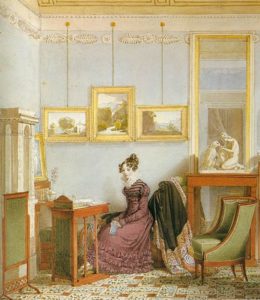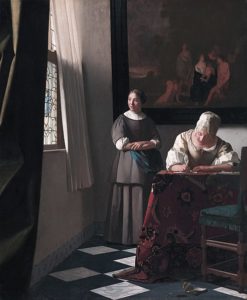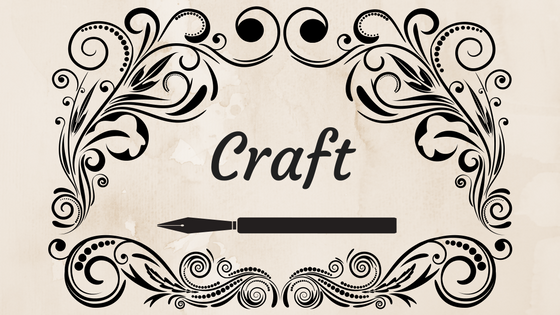by Alina K. Field
You’ve read all the fiction and seen all the movies but is that enough research for your romantic suspense set in Roman Britain, or Louis XIV’s Versailles, or the California Gold Rush?
It may be enough to get started on a first draft, but probably not enough for a polished final product. Movies almost never get all of the history right, and some fiction authors can be careless also.
How much research is enough?
Here’s my take on the answer to that question.
1. Know the big picture of your historical period—mistakes can impact your plotting:

In my Regency novel, Bella’s Band, I had my heroine traveling to a country estate in a carriage. A key part of the action was the villain taking over as a substitute coachman. I didn’t know that most cross-country travelers used post-riders to “steer” their horses, not coachmen. Fixing that first-draft mistake required some plot wrangling.
Get a good feel for your historical period’s methods and speed of travel, available technology and weaponry, and social customs and standards. The more you know, the easier it is to make plot adjustments in the first draft.
2. Get the small descriptive details right:
Little things matter, and I’ll tell you why in a minute.
First, let me share a near-blunder that still humbles me. My dive into writing historical romance came about because of a call for submissions for a holiday historical romance novella. I’d been honing my skills on contemporary romances and doing well in contests, but not selling. I figured, I like to read Regencies, why not write one and submit it? Easy, right?
That novella, Rosalyn’s Ring, was my first sale. In the second round of edits, the writing fairies whispered into my ear to check one tiny detail in the story. It turned out my heroine couldn’t stuff matches into her bag—the Little Match Girl arrived in the Victorian era. My editor had missed that detail also!
The problem was easily solved and I learned all about tinderboxes. But what a near-miss!
Why do little things matter?
Because historical errors throw the savvy, knowledgeable, passionate-for-the-period reader right out of the story. And you don’t want to lose that reader! You want him or her to tell everyone how spot on you were in your historical details.
However…
Not every reader is so particular. In the Regency romance world, there are different markets, with different reader expectations.
Traditional Regencies are short and sweet (as in low sensuality), and typically include fashion details. Regency historical romances are steamier. Sometimes these steamy stories are simply “Regency-set”, or “Wallpaper Historicals”—a disparaging term for modern characters and stories thrown into a Regency setting. “Modern characters” are usually Regency ladies who do something besides drinking tea, going to Almack’s, or visiting the modiste.
 Some New York Times bestselling Regency romance authors write stories that fall into the Wallpaper category, stories so good that their fans overlook errors. Bravo to them for expanding the market and bringing fresh readers into the Regency world!
Some New York Times bestselling Regency romance authors write stories that fall into the Wallpaper category, stories so good that their fans overlook errors. Bravo to them for expanding the market and bringing fresh readers into the Regency world!
Other readers really, really, really object to the slightest historical error or anachronism. My goal is to try to reach both markets by writing a good story and getting the historical details right.
11 Quick Tips
- Word choice matters. I use etymonline.com to quickly check whether a particular word was in use during my period, and I rely on my British editor to catch my Americanisms. If you’re writing a story set in, for example, ancient Rome, you have more leeway, but be mindful of using words that are too modern.
- Nurture your historical voice. Read memoirs and books written during your era. You’ll get a feel for how people spoke, learn interesting details you can use in your stories, and maybe find inspiration. Many can be downloaded free at Google Books.
- Read nonfiction about your period.
- Join a writers’ group focused on your era. I’ve learned a great deal from the experts at the Beau Monde Chapter of RWA.
- Attend historical reenactments. They’re fun and a great place to study costuming and meet period experts.
- Subscribe to like-minded blogs. Check out the “Blogs We Follow” column at Two Nerdy History Girls for ideas.
- Find inspiring images at Wikimedia Commons or Pinterest.
- If possible, find an editor who knows the era you’re writing in.
- A touch of historical detail goes a long way. Don’t go crazy with description. Most readers will skim it.
- If all else fails and you can’t track down a detail, be plausibly vague. That’s my policy! ‘
- Get started writing that first draft and finish it! You never know what you can accomplish until you’ve typed “the end”.
Do you have any other tips or resources? Please share in the comments!
***
Award winning author Alina K. Field earned a Bachelor of Arts Degree in English and German literature, but her true passion is the much happier world of romance fiction. Though her roots are in the Midwestern U.S., after six very, very, very cold years in Chicago, she moved to Southern California and hasn’t looked back. She shares a midcentury home with her husband, her spunky, blonde, rescued terrier, and the blue-eyed cat who conned his way in for dinner one day and decided the food was too good to leave.
She is the author of several Regency romances, including the 2014 Book Buyer’s Best winner, Rosalyn’s Ring. She is hard at work on her next series of Regency romances, but loves to hear from readers! www.AlinaKField.com





Great post, Alina. I’ve been thrown out of stories with inaccuracies. Movies, too. The worst movie error was in Mel Gibson’s Bird on a Wire. They took a quick trip from Detroit to Racine, Wisconsin. That’s no quick trip by boat since Detroit is on the east side of Michigan and Racine is west of the state across Lake Michigan. I still can’t see the name of that movie without thinking of that glaring error. Fact-checking is more important than you know.
Mel took artistic license with the facts in Braveheart also! Thanks for stopping by, Diane, and congratulations on your new release!
Great tips, Alina! Thanks for sharing!
Thanks for taking the time to comment, Jenna!
This was a great read. I never thought about attending historical reenactments. That is great advice. Before I start my Regency series, I really want to attend the Jane Austen Festival. Of course, that is in England, but I think I can handle a trip overseas!
Kara, I highly recommend finding a group in your area that does English Country dancing and attend one of their dances. It’s so interesting. And if you’re an RWA member consider joining the Beau Monde chapter. Oh, and Colonial Williamsburg is fantastic!
Thanks for sharing such great info. When we lived in VA, we loved visiting Colonial Williamsburg, Mount Vernon, Monticello, and all the fantastic historical sites.
There are so many great historical places to see on the east coast. Thanks for stopping by today, Marissa, and congratulations on finaling in the Daphne!
Excellent post. Thanks for the tips!
You’ve presented a clear argument for not writing historical fiction. Just kidding, but it is daunting.
I’d never heard the term Wallpaper Historicals, but I’ve been turned off by them a number of times. I think getting your characters and setting right is so important. If your protagonist is going to do something a woman of the time probably wouldn’t, at least make it clear her behavior is unusual!
Great article, Alina.